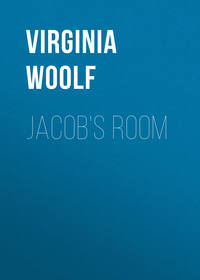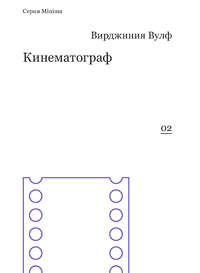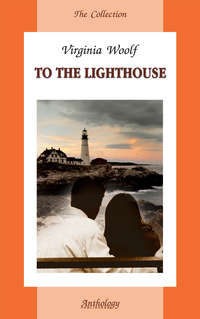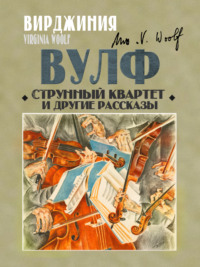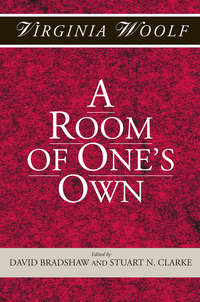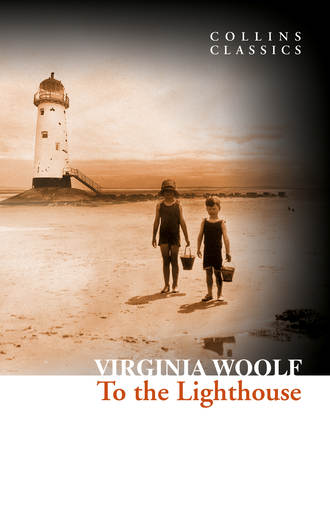
Полная версия
To the Lighthouse
She could not help laughing herself sometimes. She said, the other day, something about ‘waves mountains high’. Yes, said Charles Tansley, it was a little rough. ‘Aren’t you drenched to the skin?’ she had said. ‘Damp, not wet through,’ said Mr Tansley, pinching his sleeve, feeling his socks.
But it was not that they minded, the children said. It was not his face; it was not his manners. It was him – his point of view. When they talked about something interesting, people, music, history, anything, even said it was a fine evening so why not sit out of doors, then what they complained of about Charles Tansley was that until he had turned the whole thing round and made it somehow reflect himself and disparage them, put them all on edge somehow with his acid way of peeling the flesh and blood off everything, he was not satisfied. And he would go to picture galleries, they said, and he would ask one, did one like his tie? God knows, said Rose, one did not.
Disappearing as stealthily as stags from the dinner-table directly the meal was over, the eight sons and daughters of Mr and Mrs Ramsay sought their bedrooms, their fastnesses in a house where there was no other privacy to debate anything, everything; Tansley’s tie; the passing of the Reform Bill; sea-birds and butterflies; people; while the sun poured into those attics, which a plank alone separated from each other so that every footstep could be plainly heard and the Swiss girl sobbing for her father who was dying of cancer in a valley of the Grisons, and lit up bats, flannels, straw hats, ink-pots, paint-pots, beetles, and the skulls of small birds, while it drew from the long frilled strips of seaweed pinned to the wall a smell of salt and weeds, which was in the towels too, gritty with sand from bathing.
Strife, divisions, difference of opinion, prejudices twisted into the very fibre of being, oh that they should begin so early, Mrs Ramsay deplored. They were so critical, her children. They talked such nonsense. She went from the dining-room, holding James by the hand, since he would not go with the others. It seemed to her such nonsense – inventing differences, when people, heaven knows, were different enough without that. The real differences, she thought, standing by the drawing-room window, are enough, quite enough. She had in mind at the moment, rich and poor, high and low; the great in birth receiving from her, half grudging, some respect, for had she not in her veins the blood of that very noble, if slightly mythical, Italian house, whose daughters, scattered about English drawing-rooms in the nineteenth century, had lisped so charmingly, had stormed so wildly, and all her wit and her bearing and her temper came from them, and not from the sluggish English, or the cold Scotch; but more profoundly she ruminated the other problem, of rich and poor, and the things she saw with her own eyes, weekly, daily, here or in London, when she visited this widow, or that struggling wife in person with a bag on her arm, and a note-book and pencil with which she wrote down in columns carefully ruled for the purpose wages and spendings, employment and unemployment, in the hope that thus she would cease to be a private woman whose charity was half a sop to her own indignation, half a relief to her own curiosity, and become, what with her untrained mind she greatly admired, an investigator, elucidating the social problem.
Insoluble questions they were, it seemed to her, standing there, holding James by the hand. He had followed her into the drawing-room, that young man they laughed at; he was standing by the table, fidgeting with something, awkwardly, feeling himself out of things, as she knew without looking round. They had all gone – the children; Minta Doyle and Paul Rayley; Augustus Carmichael; her husband – they had all gone. So she turned with a sigh and said, ‘Would it bore you to come with me, Mr Tansley?’
She had a dull errand in the town; she had a letter or two to write; she would be ten minutes perhaps; she would put on her hat. And, with her basket and her parasol, there she was again, ten minutes later, giving out a sense of being ready, of being equipped for a jaunt, which, however, she must interrupt for a moment, as they passed the tennis lawn, to ask Mr Carmichael, who was basking with his yellow cat’s eyes ajar, so that like a cat’s they seemed to reflect the branches moving or the clouds passing, but to give no inkling of any inner thoughts or emotion whatsoever, if he wanted anything.
For they were making the great expedition, she said, laughing. They were going to the town. ‘Stamps, writing-paper, tobacco?’ she suggested, stopping by his side. But no, he wanted nothing. His hands clasped themselves over his capacious paunch, his eyes blinked, as if he would have liked to reply kindly to these blandishments (she was seductive but a little nervous) but could not, sunk as he was in a grey-green somnolence which embraced them all, without need of words, in a vast and benevolent lethargy of well-wishing; all the house; all the world; all the people in it, for he had slipped into his glass at lunch a few drops of something, which accounted, the children thought, for the vivid streak of canary-yellow in moustache and beard that were otherwise milk-white. He wanted nothing, he murmured.
He should have been a great philosopher, said Mrs Ramsay, as they went down the road to the fishing village, but he had made an unfortunate marriage. Holding her black parasol very erect, and moving with an indescribable air of expectation, as if she were going to meet someone round the corner, she told the story; an affair at Oxford with some girl; an early marriage; poverty; going to India; translating a little poetry ‘very beautifully, I believe’, being willing to teach the boys Persian or Hindustanee, but what really was the use of that? – and then lying, as they saw him, on the lawn.
It flattered him; snubbed as he had been, it soothed him that Mrs Ramsay should tell him this. Charles Tansley revived. Insinuating, too, as she did the greatness of man’s intellect, even in its decay, the subjection of all wives – not that she blamed the girl, and the marriage had been happy enough, she believed – to their husband’s labours, she made him feel better pleased with himself than he had done yet, and he would have liked, had they taken a cab, for example, to have paid the fare. As for her little bag, might he not carry that? No, no, she said, she always carried that herself. She did too. Yes, he felt that in her. He felt many things, something in particular that excited him and disturbed him for reasons which he could not give. He would like her to see him, gowned and hooded, walking in a procession. A fellowship, a professorship, – he felt capable of anything and saw himself – but what was she looking at? At a man pasting a bill. The vast flapping sheet flattened itself out, and each shove of the brush revealed fresh legs, hoops, horses, glistening reds and blues, beautifully smooth, until half the wall was covered with the advertisement of a circus; a hundred horsemen, twenty performing seals, lions, tigers … Craning forwards, for she was short-sighted, she read out how it … ‘will visit this town.’ It was terribly dangerous work for a one-armed man, she exclaimed, to stand on top of a ladder like that – his left arm had been cut off in a reaping machine two years ago.
‘Let us all go!’ she cried, moving on, as if all those riders and horses had filled her with child-like exultation and made her forget her pity.
‘Let’s go,’ he said, repeating her words, clicking them out, however, with a self-consciousness that made her wince. ‘Let us go to the Circus.’ No. He could not say it right. He could not feel it right. But why not? she wondered. What was wrong with him then? She liked him warmly, at the moment. Had they not been taken, she asked, to circuses when they were children? Never, he answered, as if she asked the very thing he wanted to reply to; had been longing all these days to say, how they did not go to circuses. It was a large family, nine brothers and sisters, and his father was a working man; ‘My father is a chemist, Mrs Ramsay. He keeps a shop.’ He himself had paid his own way since he was thirteen. Often he went without a greatcoat in winter. He could never ‘return hospitality’ (those were his parched stiff words) at college. He had to make things last twice the time other people did; he smoked the cheapest tobacco; shag; the same the old men smoked on the quays. He worked hard – seven hours a day; his subject was now the influence of something upon somebody – they were walking on and Mrs Ramsay did not quite catch the meaning, only the words, here and there … dissertation … fellowship … readership … lectureship. She could not follow the ugly academic jargon, that rattled itself off so glibly, but said to herself that she saw now why going to the circus had knocked him off his perch, poor little man, and why he came out, instantly, with all that about his father and mother and brothers and sisters, and she would see to it that they didn’t laugh at him any more; she would tell Prue about it. What he would have liked, she supposed, would have been to say how he had been to Ibsen with the Ramsays. He was an awful prig – oh yes, an insufferable bore. For, though they had reached the town now and were in the main street, with carts grinding past on the cobbles, still he went on talking, about settlements, and teaching, and working men, and helping our own class, and lectures, till she gathered that he had got back entire self-confidence, had recovered from the circus, and was about (and now again she liked him warmly) to tell her – but here, the houses falling away on both sides, they came out on the quay, and the whole bay spread before them and Mrs Ramsay could not help exclaiming, ‘Oh, how beautiful!’ For the great plateful of blue water was before her; the hoary Lighthouse, distant austere, in the midst; and on the right, as far as the eye could see, fading and falling, in soft low pleats, the green sand dunes with the wild flowing grasses on them, which always seemed to be running away into some moon country, uninhabited of men.
That was the view, she said, stopping, growing greyer-eyed, that her husband loved.
She paused a moment. But now, she said, artists had come here. There indeed, only a few paces off, stood one of them, in Panama hat and yellow boots, seriously, softly, absorbedly, for all that he was watched by ten little boys, with an air of profound contentment on his round red face, gazing, and then, when he had gazed, dipping; imbuing the tip of his brush in some soft mound of green or pink. Since Mr Paunceforte had been there, three years before, all the pictures were like that she said, green and grey, with lemon-coloured sailing-boats, and pink women on the beach.
But her grandmother’s friends, she said, glancing discreetly as they passed, took the greatest pains; first they mixed their own colours, and then they ground them, and then they put damp cloths on them to keep them moist.
So Mr Tansley supposed she meant him to see that that man’s picture was skimpy, was that what one said? The colours weren’t solid? Was that what one said? Under the influence of that extraordinary emotion which had been growing all the walk, had begun in the garden when he had wanted to take her bag, had increased in the town when he had wanted to tell her everything about himself, he was coming to see himself and everything he had ever known gone crooked a little. It was awfully strange.
There he stood in the parlour of the poky little house where she had taken him, waiting for her, while she went upstairs a moment to see a woman. He heard her quick step above; heard her voice cheerful, then low; looked at the mats, tea-caddies, glass shades; waited quite impatiently; looked forward eagerly to the walk home, determined to carry her bag; then heard her come out; shut a door; say they must keep the windows open and the doors shut, ask at the house for anything they wanted (she must be talking to a child), when, suddenly, in she came, stood for a moment silent (as if she had been pretending up there, and for a moment let herself be now), stood quite motionless for a moment against a picture of Queen Victoria wearing the blue ribbon of the Garter; and all at once he realised that it was this: it was this: – she was the most beautiful person he had ever seen.
With stars in her eyes and veils in her hair, with cyclamen and wild violets – what nonsense was he thinking? She was fifty at least; she had eight children. Stepping through fields of flowers and taking to her breast buds that had broken and lambs that had fallen; with the stars in her eyes and the wind in her hair – He took her bag.
‘Good-bye, Elsie,’ she said, and they walked up the street, she holding her parasol erect and walking as if she expected to meet someone round the corner, while for the first time in his life Charles Tansley felt an extraordinary pride; a man digging in a drain stopped digging and looked at her; let his arm fall down and looked at her; Charles Tansley felt an extraordinary pride; felt the wind and the cyclamen and the violets for he was walking with a beautiful woman for the first time in his life. He had hold of her bag.
II
‘No going to the Lighthouse, James,’ he said, as he stood by the window, speaking awkwardly, but trying in deference to Mrs Ramsay to soften his voice into some semblance of geniality at least.
Odious little man, thought Mrs Ramsay, why go on saying that?
III
‘Perhaps you will wake up and find the sun shining and the birds singing,’ she said compassionately, smoothing the little boy’s hair, for her husband, with his caustic saying that it would not be fine, had dashed his spirits she could see. This going to the Lighthouse was a passion of his, she saw, and then, as if her husband had not said enough, with his caustic saying that it would not be fine tomorrow, this odious little man went and rubbed it in all over again.
‘Perhaps it will be fine tomorrow,’ she said, smoothing his hair.
All she could do now was to admire the refrigerator, and turn the pages of the Stores list in the hope that she might come upon something like a rake, or a mowing-machine, which, with its prongs and its handles, would need the greatest skill and care in cutting out. All these young men parodied her husband, she reflected; he said it would rain; they said it would be a positive tornado.
But here, as she turned the page, suddenly her search for the picture of a rake or a mowing-machine was interrupted. The gruff murmur, irregularly broken by the taking out of pipes and the putting in of pipes which had kept on assuring her, though she could not hear what was said (as she sat in the window), that the men were happily talking; this sound, which had lasted now half an hour and had taken its place soothingly in the scale of sounds pressing on top of her, such as the tap of balls upon bats, the sharp, sudden bark now and then, ‘How’s that? How’s that?’ of the children playing cricket, had ceased; so that the monotonous fall of the waves on the beach, which for the most part beat a measured and soothing tattoo to her thoughts and seemed consolingly to repeat over and over again as she sat with the children the words of some old cradle song, murmured by nature, ‘I am guarding you – I am your support’, but at other times suddenly and unexpectedly, especially when her mind raised itself slightly from the task actually in hand, had no such kindly meaning, but like a ghostly roll of drums remorselessly beat the measure of life, made one think of the destruction of the island and its engulfment in the sea, and warned her whose day had slipped past in one quick doing after another that it was all ephemeral as a rainbow – this sound which had been obscured and concealed under the other sounds suddenly thundered hollow in her ears and made her look up with an impulse of terror.
They had ceased to talk; that was the explanation. Falling in one second from the tension which had gripped her to the other extreme which, as if to recoup her for her unnecessary expense of emotion, was cool, amused, and even faintly malicious, she concluded that poor Charles Tansley had been shed. That was of little account to her. If her husband required sacrifices (and indeed he did) she cheerfully offered up to him Charles Tansley, who had snubbed her little boy.
One moment more, with her head raised, she listened, as if she waited for some habitual sound, some regular mechanical sound; and then, hearing something rhythmical, half said, half chanted, beginning in the garden, as her husband beat up and down the terrace, something between a croak and a song, she was soothed once more, assured again that all was well, and looking down at the book on her knee found the picture of a pocket knife with six blades which could only be cut out if James was very careful.
Suddenly a loud cry, as of a sleep-walker, half roused, something about
Stormed at with shot and shell
sung out with the utmost intensity in her ear, made her turn apprehensively to see if any one heard him. Only Lily Briscoe, she was glad to find; and that did not matter. But the sight of the girl standing on the edge of the lawn painting reminded her; she was supposed to be keeping her head as much in the same position as possible for Lily’s picture. Lily’s picture! Mrs Ramsay smiled. With her little Chinese eyes and her puckered-up face she would never marry; one could not take her painting very seriously; but she was an independent little creature, Mrs Ramsay liked her for it, and so remembering her promise, she bent her head.
IV
Indeed, he almost knocked her easel over, coming down upon her with his hands waving, shouting out ‘Boldly we rode and well’, but, mercifully, he turned sharp, and rode off, to die gloriously she supposed upon the heights of Balaclava. Never was anybody at once so ridiculous and so alarming. But so long as he kept like that, waving, shouting, she was safe; he would not stand still and look at her picture. And that was what Lily Briscoe could not have endured. Even while she looked at the mass, at the line, at the colour, at Mrs Ramsay sitting in the window with James, she kept a feeler on her surroundings lest someone should creep up, and suddenly she should find her picture looked at. But now, with all her senses quickened as they were, looking, straining, till the colour of the wall and the jacmanna beyond burnt into her eyes, she was aware of someone coming out of the house, coming towards her; but somehow divined, from the footfall, William Bankes, so that though her brush quivered, she did not, as she would have done had it been Mr Tansley, Paul Rayley, Minta Doyle, or practically anybody else, turn her canvas upon the grass, but let it stand. William Bankes stood beside her.
They had rooms in the village, and so, walking in, walking out, parting late on door-mats, had said little things about the soup, about the children, about one thing and another which made them allies; so that when he stood beside her now in his judicial way (he was old enough to be her father too, a botanist, a widower, smelling of soap, very scrupulous and clean) she just stood there. He just stood there. Her shoes were excellent, he observed. They allowed the toes their natural expansion. Lodging in the same house with her, he had noticed too, how orderly she was, up before breakfast and off to paint, he believed, alone: poor, presumably, and without the complexion or the allurement of Miss Doyle certainly, but with a good sense which made her in his eyes superior to that young lady. Now, for instance, when Ramsay bore down on them, shouting, gesticulating, Miss Briscoe, he felt certain, understood.
Someone had blundered.
Mr Ramsay glared at them. He glared at them without seeming to see them. That did make them both vaguely uncomfortable. Together they had seen a thing they had not been meant to see. They had encroached upon a privacy. So, Lily thought, it was probably an excuse of his for moving, for getting out of earshot, that made Mr Bankes almost immediately say something about its being chilly and suggest taking a stroll. She would come, yes. But it was with difficulty that she took her eyes off her picture.
The jacmanna was bright violet; the wall staring white. She would not have considered it honest to tamper with the bright violet and the staring white, since she saw them like that, fashionable though it was, since Mr Paunceforte’s visit, to see everything pale, elegant, semi-transparent. Then beneath the colour there was the shape. She could see it all so clearly, so commandingly, when she looked: it was when she took her brush in hand that the whole thing changed. It was in that moment’s flight between the picture and her canvas that the demons set on her who often brought her to the verge of tears and made this passage from conception to work as dreadful as any down a dark passage for a child. Such she often felt herself – struggling against terrific odds to maintain her courage; to say: ‘But this is what I see; this is what I see’, and so to clasp some miserable remnant of her vision to her breast, which a thousand forces did their best to pluck from her. And it was then too, in that chill and windy way, as she began to paint, that there forced themselves upon her other things, her own inadequacy, her insignificance, keeping house for her father off the Brompton Road, and had much ado to control her impulse to fling herself (thank Heaven she had always resisted so far) at Mrs Ramsay’s knee and say to her – but what could one say to her? ‘I’m in love with you?’ No, that was not true. ‘I’m in love with this all’, waving her hand at the hedge, at the house, at the children? It was absurd, it was impossible. One could not say what one meant. So now she laid her brushes neatly in the box, side by side, and said to William Bankes:
‘It suddenly gets cold. The sun seems to give less heat,’ she said, looking about her, for it was bright enough, the grass still a soft deep green, the house starred in its greenery with purple passion flowers, and rooks dropping cool cries from the high blue. But something moved, flashed, turned a silver wing in the air. It was September after all, the middle of September, and past six in the evening. So off they strolled down the garden in the usual direction, past the tennis lawn, past the pampas grass, to that break in the thick hedge, guarded by red-hot pokers like brasiers of clear burning coal, between which the blue waters of the bay looked bluer than ever.
They came there regularly every evening drawn by some need. It was as if the water floated off and set sailing thoughts which had grown stagnant on dry land, and gave to their bodies even some sort of physical relief. First, the pulse of colour flooded the bay with blue, and the heart expanded with it and the body swam, only the next instant to be checked and chilled by the prickly blackness on the ruffled waves. Then, up behind the great black rock, almost every evening spurted irregularly, so that one had to watch for it and it was a delight when it came, a fountain of white water; and then, while one waited for that, one watched, on the pale semicircular beach, wave after wave shedding again and again smoothly a film of mother-of-pearl.
They both smiled, standing there. They both felt a common hilarity, excited by the moving waves; and then by the swift cutting race of a sailing boat, which, having sliced a curve in the bay, stopped; shivered; let its sail drop down; and then, with a natural instinct to complete the picture, after this swift movement, both of them looked at the dunes far away, and instead of merriment felt come over them some sadness – because the thing was completed partly, and partly because distant views seem to outlast by a million years (Lily thought) the gazer and to be communing already with a sky which beholds an earth entirely at rest.
Looking at the far sandhills, William Bankes thought of Ramsay: thought of a road in Westmorland, thought of Ramsay striding along a road by himself hung round with that solitude which seemed to be his natural air. But this was suddenly interrupted, William Bankes remembered (and this must refer to some actual incident), by a hen, straddling her wings out in protection of a covey of little chicks, upon which Ramsay, stopping, pointed his stick and said ‘Pretty – pretty,’ an odd illumination into his heart, Bankes had thought it, which showed his simplicity, his sympathy with humble things; but it seemed to him as if their friendship had ceased, there, on that stretch of road. After that, Ramsay had married. After that, what with one thing and another, the pulp had gone out of their friendship. Whose fault it was he could not say, only, after a time, repetition had taken the place of newness. It was to repeat that they met. But in this dumb colloquy with the sand dunes he maintained that his affection for Ramsay had in no way diminished; but there, like the body of a young man laid up in peat for a century, with the red fresh on his lips, was his friendship, in its acuteness and reality laid up across the bay among the sandhills.


